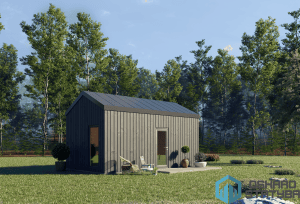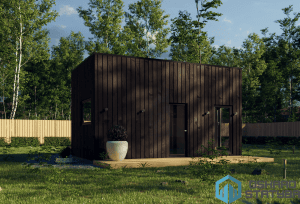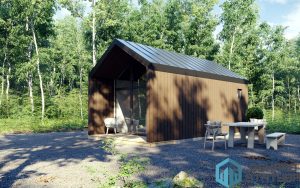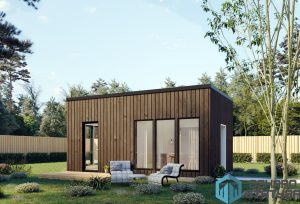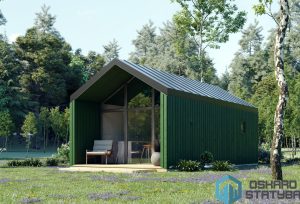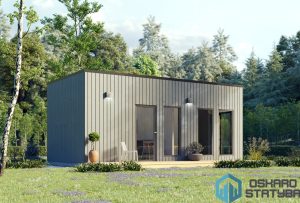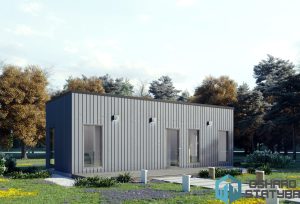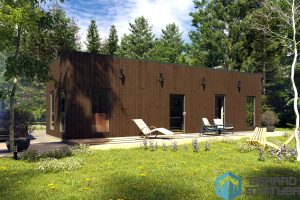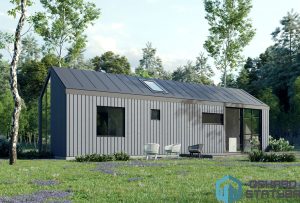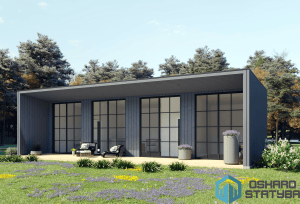Screw piles are steel elements screwed into the ground with a spiral thread design that ensure the stability of the building without requiring complex ground preparation work or the use of concrete.
This is an economical and effective choice for small and medium-sized structures such as fences, terraces or frame houses .
These piles provide a solid foundation in any soil and are valued for their quick installation, durability, and minimal environmental impact, making them a popular choice for foundations.
Oskarostatyba.lt builds frame houses with screw piles
- Fast foundation installation – screw piles are installed within a few hours, and the house construction process can begin immediately.
- Cost-effectiveness – there is no need for expensive excavation work, the use of concrete or heavy equipment, therefore reducing the costs of installing foundations.
- Suitability for various soils – screw piles are suitable for sandy, clayey or mixed soils, so our frame houses can be built even in difficult conditions.
- Durability – galvanized steel ensures the piles are resistant to corrosion and allows the foundations to last up to 30 years, maintaining the stability of the structure.
- Construction in all seasons – screw piles can be installed even in winter, so house construction can begin even in the cold season.
- Contact us to discuss your project – Tel: +370 600 48 538 .
How are screw piles installed?
Screw piles are driven into the ground using a special twisting method, without digging or additional soil consolidation work. The spiral shape compacts the soil around the pile, so it is stably established and maintains its position. The vertical load is evenly distributed, so the piles do not collapse even in weaker soil.
Screw foundations are suitable for various types of soil, but it is necessary to take into account the properties of the soil. In sandy or gravelly soil, it is recommended to use longer piles to ensure maximum stability.
What are the advantages of screw piles?
Quick to install
Installation takes just a few hours. Screw piles are driven in with manual or mechanized tools, so there is no need to wait for the concrete to set, as in traditional foundation solutions.
This allows construction work to continue on the same day. Even in cold weather, installation is not delayed because there is no need for concrete, which sets more slowly in the cold season.
Economical
Reduces overall foundation installation costs. Since there is no need for excavation, concrete, or heavy equipment, labor, transportation, and material costs are reduced.
In addition, there is no need to allocate additional funds for environmental management, as the installation process does not cause soil damage.
Environmentally friendly
Screw piles are environmentally friendly. Since there is no need to dig the ground or transport heavy waste, carbon dioxide emissions are also reduced.
The soil remains intact and the construction site is clean and tidy. This solution is environmentally friendly and ideal for areas where ecosystem protection is important, such as near water bodies or in forests.
Long-lasting
Made of high-quality galvanized steel, screw piles are corrosion-resistant and last 25-30 years.
The hot-dip galvanized coating ensures resistance to moisture and chemicals in the soil. Even after prolonged exposure to environmental influences, the piles retain their mechanical properties.
Universal
Screw piles are suitable for various types of structures and soils. They are used for light and medium-weight structures such as frame houses, terraces, sheds, walkways or fences.
They are also an excellent choice for areas with difficult soils, including sandy or clay soils, where installing traditional foundations would be difficult or impossible.
What loads can screw piles withstand?
Screw piles can withstand loads of up to 8.5 tons. The load depends on the size of the piles, the type of construction and the properties of the soil.
Here are some examples:
| Screw Pole Length (cm) | Diameter (mm) | Soil Type | Maximum Load (kg) | Adaptation Structures | Installation Conditions |
| 70cm | 60mm | Hard clay | 400 kg | Small terraces, gazebos, small fences | Can be installed manually, no special equipment required |
| 100cm | 76 mm | Dense sand | 600 kg | Fences, light canopies, small steps | Suitable for medium-hard soil conditions |
| 130 cm | 89 mm | Loose sand | 800 kg | Medium-sized terraces, log cabins | Requires mechanical installation, suitable for looser soil |
| 160 cm | 114 mm | Gravel | 850 kg | Frame houses, heavier structures, larger piers | Suitable for difficult soil, special equipment required |
| 200cm | 140mm | Clayey or unstable soil | 1000 kg | Large frame buildings, load-bearing structures | Requires deep installation, suitable for areas with seasonal frost |
Are screw piles suitable for cold Lithuanian winters?
Screw piles are perfectly suited to the Lithuanian climate and maintain their stability even during cold winters. They are installed deeper than the winter frost layer (800–1200 mm), so they are not affected by the effects of frost.
The spiral design ensures that they will not be moved by freezing and thawing of the ground. Properly installed screw foundations remain stable even after long and harsh winters.
Why is it worth choosing screw piles instead of concrete piles?
Screw piles are a faster and more economical solution than concrete foundations.
They take just a few hours to install, and there is no need to wait for the concrete to set, so the construction process goes smoothly even in winter. These piles are ideal for areas where it is difficult to transport concrete or use heavy machinery.
In addition, their installation does not require digging the ground, which means less damage to the environment. The durability and resistance to difficult conditions of screw piles ensure the suitability of this solution for the foundations of various structures, such as terraces, fences or light frame houses.
This is a modern and effective solution that saves time and costs.



